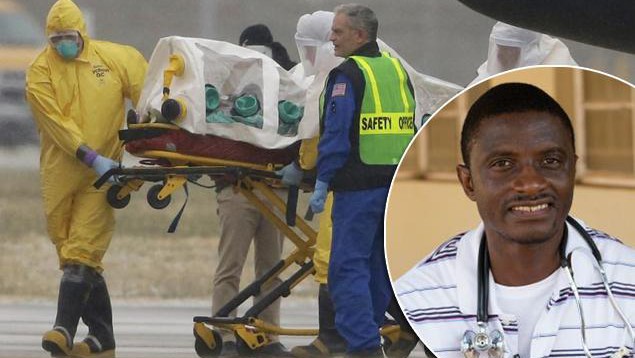
A surgeon who contracted Ebola in his native Sierra Leone did not receive aggressive treatment until nearly two weeks after he first started showing symptoms — a delay that doctors said probably made it impossible for anyone to save his life.
Dr. Martin Salia was in the 13th day of his illness when he reached Omaha on Saturday. He had waited three days to be formally diagnosed after an initial test for Ebola came back negative. He then waited five more days to be flown to the United States. By the time he got to Nebraska, the 44-year-old Maryland-based surgeon was unconscious, struggling to breathe and his kidneys had failed.
The medical team at Nebraska Medical Center, experienced from saving the lives of two previous patients, swung into action, pumping Salia full of salt water and vital compounds to replace lost fluids, working to save his kidneys with dialysis, helping him to breathe with a ventilator. They gave him blood serum full of antibodies from one of the eight U.S. survivors — they didn’t say which one — and even managed to track down a dose of the rare experimental drug ZMapp.
But Salia died Monday, despite this “truly heroic effort,” Dr. Jeffrey Gold, chancellor of the University of Nebraska’s medical center, said at a televised news conference.
“I am very, very proud of the care we provided. I know that we gave him every possible chance to survive,” infectious disease specialist Dr. Dan Johnson told the news conference. He said he couldn’t immediately see anything the team at Nebraska could have done differently to save Salia.
It’s a clear example of why Ebola has a 70 percent mortality rate in Africa, while most patients treated in the U.S. have lived. Most patients in Liberia, Guinea and Sierra Leone are not showing up for treatment until they are already very ill and it’s too late to reverse the damage the virus has caused to their bodies.
“In the very advanced stages, even the modern techniques we have at our disposal are not enough to help these patients once they reach a critical threshold,” said Dr. Gold. And of course, clinics in West Africa often cannot even deliver intravenous saline, let alone more advanced treatment.
Misdiagnosis, treatment delays likely contributed to death
Salia, who chose to work at a Methodist hospital in his homeland despite more lucrative opportunities elsewhere, first felt ill during the first week of November. But he hadn’t been treating Ebola patients and he’d already come through a 21-day incubation period after a close call with an Ebola patient. And his first blood test for Ebola came back negative on November 7, so he was treated for malaria instead.
Salia did not get any better with malaria treatment, so he was given a second test for Ebola, which came back positive on Nov. 10. Still, it would be five more days before Salia’s arrival at the Omaha hospital.
Experts have said all along it’s not unusual to get a negative test for Ebola the first time. It takes a while for the virus to build up in the blood. For example, epidemiological evidence suggests that most patients develop the first sign of illness — usually, a fever — about a week after the initial infection. But at that point, the viral load — the amount of virus in the body — is still relatively low, which is why people are not considered highly symptomatic during the early stages of illness. However, within only a few days the more serious signs like diarrhea and vomiting emerge; hence, by the time there’s enough virus in the blood to set off a positive test, it’s also enough to cause more advanced symptoms.
Those few days of delay may have made the difference between life and death for Salia, a legal resident of the U.S. with a wife and two children in Maryland. Two other Ebola patients treated in Omaha this fall arrived at the hospital roughly a week earlier in their illnesses, before nausea, vomiting and more serious symptoms set in. Both of those men recovered.
“We used every possible treatment available to give Dr. Salia every possible opportunity for survival,” said Dr. Phil Smith, who successfully treated medical missionary Dr. Rick Sacra and NBC camera operator Ashoka Mukpo for Ebola. “As we have learned, early treatment with these patients is essential. In Dr. Salia’s case, his disease was already extremely advanced by the time he came here for treatment.”
Ebola has killed more than 5,000 people in Guinea, Sierra Leone and Liberia, causing an epidemic of more than 14,000 cases—a number the World Health Organization says it certainly an underestimate. The epidemic has spread to Mali, with three deaths, four reported cases and officials checking on hundreds of people at possible risk.
